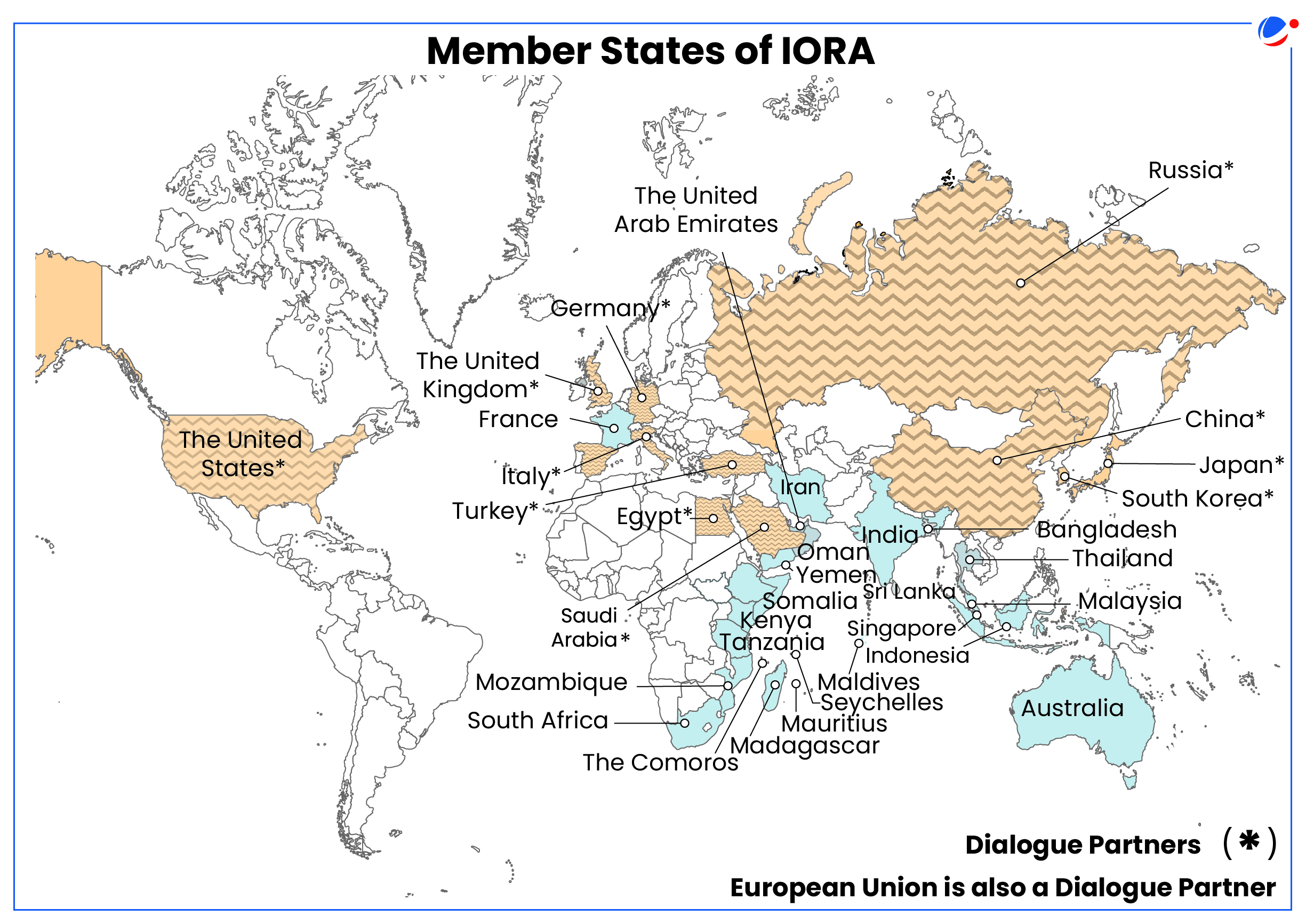Why in the News?
India will assume the chair of IORA in 2025 for the next two years.
About IORA

- Genesis: An inter-governmental organization established in 1997 with its vision originating during a visit by Nelson Mandela to India in 1995.
- Objective: Encourage regional cooperation and sustainable development within the Indian ocean region.
- Secretariat: Mauritius
- Members: 23 Members and 12 dialogue partners (see infographic)
- IORA Governance:
- IORA Council of Ministers: Highest decision making body comprised of the Minister of Foreign Affairs (or equivalent) of all Member States which meets annually.
- Troika: An institutional mechanism consisting of the current Chair, Vice-Chair, which is the future chair, and past Chair (referred to as previous chair in the Charter) of the IORA.
- Flagship Projects:
- Indian Ocean Dialogue (IOD): A Track 1.5 forum launched in 2013, encouraging open dialogue among member states, on key strategic issues in the Indian Ocean Region.
- IORA Sustainable Development Program (ISDP): Introduced in 2014 for the least developed countries (LDCs) that require assistance and support to conduct projects.
Significance of IORA bloc for India

- Geostrategic and economic significance of Indian Ocean region: Indian Ocean transports 75% of global trade and 50% of daily oil consumption and the intra IORA trade is around $800bn (2022).
- Challenges in other regional organisations: E.g., SAARC (South Asian Association for Regional Cooperation) and BIMSTEC (Bay of Bengal Initiative for Multi-Sectoral Technical and Economic Cooperation), face their own challenges like political instability, stagnant negotiations etc.
- Safe space: IORA is a less contentious space for India and other countries of the region that wish to keep out of big-power rivalries.
- E.g., the QUAD (Quadrilateral Security Dialogue) is U.S.-led, along with military allies Australia and Japan.
- Maritime Security: IORA upholds the United Nations Convention on the Law of the Sea principles and organizes regular workshops on cooperation on maritime security.
Issues related to functioning of IORA
- Funding Constraints: IORA's funds are insufficient to support its growing areas of engagement.
- Competition with other regional bodies like BIMSTEC, Indian Ocean Naval Symposium (IONS) etc. further dilutes focus and resource.
- Institutional Weaknesses: The Secretariat in Mauritius has limited staff and insufficient technological integration for effective governance.
- Geopolitical Tensions: Rivalries like India-Pakistan tensions, Russian-Ukraine war and China's involvement through the Belt and Road Initiative complicate cooperative dialogue among members and partners.
- Other issues: Lack of Private Sector Engagement in policy-making and funding contributions; non-transparent investments and unsustainable debt; Economic disparities among members; Maritime security Concerns in the Indian ocean region like Piracy off the horn of Africa, Houthi attacks etc.
Conclusion
While aligning IORA's goals with India's SAGAR (Security and Growth for All in the Region) vision, India can utilize its chairmanship to promote regional stability and development. To ensure IORA's long-term viability, sustainable funding can be secured through seed funding, PPPs, and industry engagement. Further, institutional capacity can be enhanced through visibility, high-level summits, and member-state alignment, along with strengthening maritime security through reinforced security frameworks and naval cooperation.





